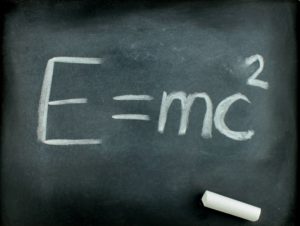
Philosophers, theologians, mathematicians, scientists all want one thing above all else, to discover or uncover INDIVISIBLE truth.
Indivisible, that’s a heavy word. It means: an idea that can’t be divided any further. It’s a perfectly consistent idea that stands on its own. It needs no further explanation in order to be understood.
Here are a couple of truths that are indivisible. Philosopher Immanuel Kant ( 1724-1804) concluded that “do unto others as you would have them do unto you” was an immutable idea. It needed no further reduction to explain itself.
Physicist Albert Einstein’s simple formula of E=mc². Energy equals mass and mass equals energy. That, Einstein said, is how the universe works. The formula cannot be reduced or explained any further than that. C(squared) is the constant speed of light in a vacuum.
It’s hard to come up with an idea that is complete. Kant was considered the greatest Enlightenment philosopher of the modern era. And of course, Albert Einstein ( 1879- 1959) was maybe the greatest genius the world has ever produced.
Let me give you a simple example of a statement that is not complete, hence not indivisible.
A younger brother yells out to his older brother, “mother has arrived”. The older brother asks, “where, where is she?” The younger brother says, ” she’s across the street”. The older brother protests, ” young brother, where across the street? Be more precise.” As you can see, the younger brother’s statements are not precise enough. He has to further define his mother’s location. If he wanted it to be a complete thought, he might have said, ” brother, mother has arrived, and she’s across the street at our aunt’s home.”
Outside of younger brothers not giving complete thoughts, organized religion seems to have the hardest time in arriving at indivisible truths. For example, one religion I’m familiar with says, God’s plan of happiness is when a man is married to a woman and they bare children. To them, this statement is an indivisible truth, in other words, it can’t be reduced any further. But, if it can, eventually leaks of contradiction will start making their appearance. This is especially the case when unreasonable resistance to improving the idea is held in place. For example, the man/woman marriage idea doesn’t include those who individuals who never marry, or those who are gay, or those who are transgender. The simple question is, ” you mean a person who isn’t married can’t be happy?” Or, ” why are there so many divorces if happiness is based on marriage?” At a minimum, one should try to answer those questions. It’s not complete enough to accept it without clarification. In other words, once you have to add on other explanations to explain the idea, the original statement no longer stands as an indivisible truth.
If you stick with an incomplete idea and persist in calling it an indivisible idea, you run the risk of an otherwise good idea, albeit incomplete, becoming a BAD idea. In time people begin to steer clear of the incomplete idea, fearing that without improvement it WILL become a bad idea. Who really wants to be caught making life decisions using a bad idea?